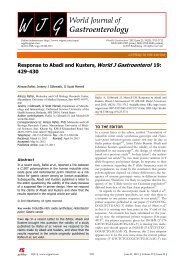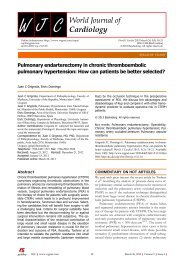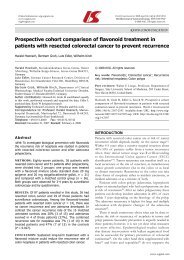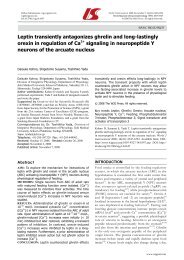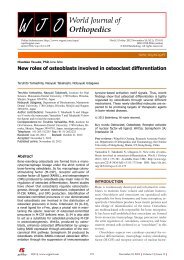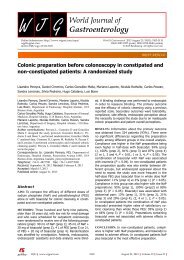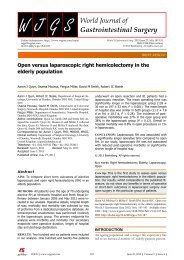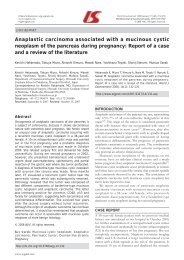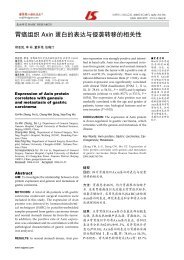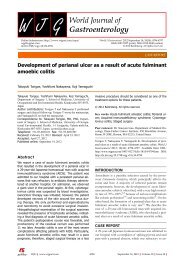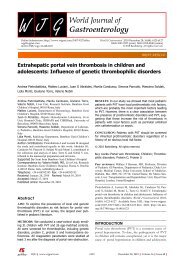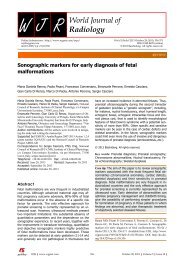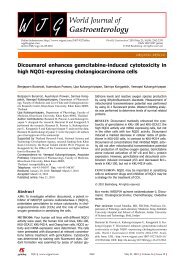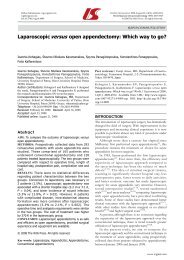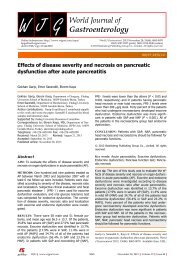and HBeAg(-) patients - World Journal of Gastroenterology
and HBeAg(-) patients - World Journal of Gastroenterology
and HBeAg(-) patients - World Journal of Gastroenterology
Create successful ePaper yourself
Turn your PDF publications into a flip-book with our unique Google optimized e-Paper software.
lyzed mutations at codon 600 in exon 15 <strong>of</strong> the BRAF<br />
gene. Therefore, mutations at other sites (e.g. codons<br />
463-468) might affect the result. Second, ethnic differences<br />
might exist in CRC between Chinese <strong>and</strong> Western populations.<br />
Liao et al [26] found that the BRAF mutation frequency<br />
was only 4.9% in 61 Chinese colorectal tissues, which is<br />
also lower than that in Western populations. Wójcik et al [27]<br />
screened for mutations in exons 11 <strong>and</strong> 15 <strong>of</strong> the BRAF<br />
gene in 163 resected adenocarcinomas in a Polish population<br />
<strong>and</strong> only six (3.7%) tumors had a missense point mutation<br />
(G469A, D594G, G596R, K601N, <strong>and</strong> two V600E).<br />
Future studies containing a larger number <strong>of</strong> Chinese<br />
samples are expected to further clarify the result.<br />
In conclusion, the mutation <strong>of</strong> the K-ras gene was a<br />
common event in our 118 Chinese CRC <strong>patients</strong>, with an<br />
obvious relationship with gender. Female <strong>patients</strong> had a<br />
higher prevalence <strong>of</strong> gene mutation than male <strong>patients</strong>.<br />
K-ras gene mutation seemed not to be an independent<br />
prognostic factor in CRC <strong>patients</strong>. The BRAF gene was<br />
rarely mutated in Chinese CRC <strong>patients</strong>.<br />
ACKNOWLEDGMENTS<br />
The authors are grateful to Hang Zhang for her kind help<br />
in collecting the tumor samples <strong>and</strong> for the clinical information<br />
concerning the colorectal cancer <strong>patients</strong>. The<br />
authors would like to thank Wei-Ting Ge for his help with<br />
the DNA sequencing data analysis.<br />
COMMENTS<br />
Background<br />
In recent years, the morbidity <strong>and</strong> mortality <strong>of</strong> colorectal cancer (CRC) has<br />
risen in the Chinese population. The K-ras <strong>and</strong> BRAF genes encode proteins<br />
that act in the extracellular signal-regulated kinase signaling pathway, which<br />
mediates cellular responses to growth factors <strong>and</strong> regulates the elements <strong>of</strong> the<br />
cell cycle, apoptosis <strong>and</strong> differentiation. Both K-ras <strong>and</strong> BRAF are prone to mutations<br />
in sporadic CRC. Mutations in K-ras could lead to constitutive activation<br />
<strong>of</strong> this pathway, resulting in cancer progression. Several recent studies have<br />
shown a strong correlation between K-ras <strong>and</strong> BRAF mutations <strong>and</strong> response<br />
to panitumumab <strong>and</strong> cetuximab.<br />
Research frontiers<br />
Results were in consistent among studies <strong>of</strong> the relationship between K-ras<br />
gene mutations <strong>and</strong> various clinicopathological characteristics. The prognostic<br />
significance <strong>of</strong> K-ras gene mutations is also controversial. With regard to the<br />
prognostic significance <strong>of</strong> the BRAF gene, less information is available in both<br />
Western <strong>and</strong> Chinese populations.<br />
Innovations <strong>and</strong> breakthroughs<br />
Recent reports have highlighted the importance <strong>of</strong> K-ras <strong>and</strong> BRAF gene mutations,<br />
the clinicopathological characteristics <strong>of</strong> CRC <strong>and</strong> its response to epidermal<br />
growth factor receptor-targeted therapies. Pyrosequencing is a powerful, sensitive<br />
<strong>and</strong> rapid sequencing method for single-nucleotide polymorphism (SNP)/mutation<br />
analysis. This is the first study to report mutations <strong>of</strong> K-ras <strong>and</strong> BRAF genes in a<br />
large population <strong>of</strong> Chinese CRC <strong>patients</strong> using pyrosequencing.<br />
Applications<br />
Using pyrosequencing technology, the authors found that K-ras gene mutations<br />
were common in Chinese CRC <strong>patients</strong>, with an obvious relationship with gender.<br />
The BRAF gene was rarely mutated in Chinese CRC <strong>patients</strong>.<br />
Terminology<br />
Pyrosequencing: Pyrosequencing is a method <strong>of</strong> determining the order <strong>of</strong><br />
nucleotides in DNA based on the “sequencing by synthesis” principle. It relies<br />
on the detection <strong>of</strong> pyrophosphate release on nucleotide incorporation, rather<br />
than chain termination with dideoxynucleotides. It is a powerful, sensitive <strong>and</strong><br />
rapid sequencing method <strong>and</strong> can be used for DNA SNP/mutation analysis.<br />
WJG|www.wjgnet.com<br />
Peer review<br />
This paper presents new results on the frequency <strong>of</strong> K-ras <strong>and</strong> BRAF mutations<br />
in colorectal carcinomas <strong>of</strong> Chinese <strong>patients</strong>.<br />
REFERENCES<br />
Shen H et al . K-ras <strong>and</strong> BRAF mutation<br />
1 Marshall CJ. Small GTPases <strong>and</strong> cell cycle regulation. Biochem<br />
Soc Trans 1999; 27: 363-370<br />
2 Li WQ, Kawakami K, Ruszkiewicz A, Bennett G, Moore J,<br />
Iacopetta B. BRAF mutations are associated with distinctive<br />
clinical, pathological <strong>and</strong> molecular features <strong>of</strong> colorectal<br />
cancer independently <strong>of</strong> microsatellite instability status. Mol<br />
Cancer 2006; 5: 2<br />
3 Rajagopalan H, Bardelli A, Lengauer C, Kinzler KW, Vogelstein<br />
B, Velculescu VE. Tumorigenesis: RAF/RAS oncogenes<br />
<strong>and</strong> mismatch-repair status. Nature 2002; 418: 934<br />
4 Davies H, Bignell GR, Cox C, Stephens P, Edkins S, Clegg S,<br />
Teague J, W<strong>of</strong>fendin H, Garnett MJ, Bottomley W, Davis N,<br />
Dicks E, Ewing R, Floyd Y, Gray K, Hall S, Hawes R, Hughes<br />
J, Kosmidou V, Menzies A, Mould C, Parker A, Stevens C,<br />
Watt S, Hooper S, Wilson R, Jayatilake H, Gusterson BA,<br />
Cooper C, Shipley J, Hargrave D, Pritchard-Jones K, Maitl<strong>and</strong><br />
N, Chenevix-Trench G, Riggins GJ, Bigner DD, Palmieri G,<br />
Cossu A, Flanagan A, Nicholson A, Ho JW, Leung SY, Yuen<br />
ST, Weber BL, Seigler HF, Darrow TL, Paterson H, Marais R,<br />
Marshall CJ, Wooster R, Stratton MR, Futreal PA. Mutations<br />
<strong>of</strong> the BRAF gene in human cancer. Nature 2002; 417: 949-954<br />
5 Vogelstein B, Fearon ER, Hamilton SR, Kern SE, Preisinger<br />
AC, Leppert M, Nakamura Y, White R, Smits AM, Bos JL.<br />
Genetic alterations during colorectal-tumor development. N<br />
Engl J Med 1988; 319: 525-532<br />
6 Bos JL. Ras oncogenes in human cancer: a review. Cancer Res<br />
1989; 49: 4682-4689<br />
7 Breivik J, Meling GI, Spurkl<strong>and</strong> A, Rognum TO, Gaudernack<br />
G. K-ras mutation in colorectal cancer: relations to patient<br />
age, sex <strong>and</strong> tumour location. Br J Cancer 1994; 69: 367-371<br />
8 Kislitsin D, Lerner A, Rennert G, Lev Z. K-ras mutations in<br />
sporadic colorectal tumors in Israel: unusual high frequency <strong>of</strong><br />
codon 13 mutations <strong>and</strong> evidence for nonhomogeneous representation<br />
<strong>of</strong> mutation subtypes. Dig Dis Sci 2002; 47: 1073-1079<br />
9 Kressner U, Bjørheim J, Westring S, Wahlberg SS, Påhlman<br />
L, Glimelius B, Lindmark G, Lindblom A, Børresen-Dale AL.<br />
Ki-ras mutations <strong>and</strong> prognosis in colorectal cancer. Eur J<br />
Cancer 1998; 34: 518-521<br />
10 Hayes VM, Westra JL, Verlind E, Bleeker W, Plukker JT,<br />
H<strong>of</strong>stra RM, Buys CH. New comprehensive denaturing-gradient-gel-<br />
electrophoresis assay for KRAS mutation detection<br />
applied to paraffin-embedded tumours. Genes Chromosomes<br />
Cancer 2000; 29: 309-314<br />
11 Martinez-Garza SG, Núñez-Salazar A, Calderon-Garcidueñas<br />
AL, Bosques-Padilla FJ, Niderhauser-García A, Barrera-<br />
Saldaña HA. Frequency <strong>and</strong> clinicopathology associations <strong>of</strong><br />
K-ras mutations in colorectal cancer in a northeast Mexican<br />
population. Dig Dis 1999; 17: 225-229<br />
12 Yuan Y, Hu HG, Ye XX, Shen H, Zheng S. [K-ras gene mutation<br />
in colorectal cancer <strong>and</strong> its clinicopathologic significance].<br />
Zhonghua Waike Zazhi 2010; 48: 1247-1251<br />
13 Gao J, Li YY, Sun PN, Shen L. Comparative analysis <strong>of</strong> dideoxy<br />
sequencing, the KRAS StripAssay <strong>and</strong> pyrosequencing<br />
for detection <strong>of</strong> KRAS mutation. <strong>World</strong> J Gastroenterol 2010;<br />
16: 4858-4864<br />
14 Ronaghi M, Karamohamed S, Pettersson B, Uhlén M, Nyrén<br />
P. Real-time DNA sequencing using detection <strong>of</strong> pyrophosphate<br />
release. Anal Biochem 1996; 242: 84-89<br />
15 Ronaghi M, Uhlén M, Nyrén P. A sequencing method based<br />
on real-time pyrophosphate. Science 1998; 281: 363, 365<br />
16 Gan YB, Cai XH, Zheng S. Detection <strong>of</strong> Ki-ras gene mutations<br />
in tumor tissues <strong>and</strong> stools <strong>of</strong> <strong>patients</strong> with colorectal carcinoma.<br />
J Zhejiang Univ (Medicine Edition) 1995; 24: 241-247<br />
17 Gan YB, Cai XH, Zheng S. The ras gene mutations in mucosa<br />
adjacent to colorectal cancer. Zhongliu Yanzhi Yanjiu 1994; 21:<br />
815 February 14, 2011|Volume 17|Issue 6|



